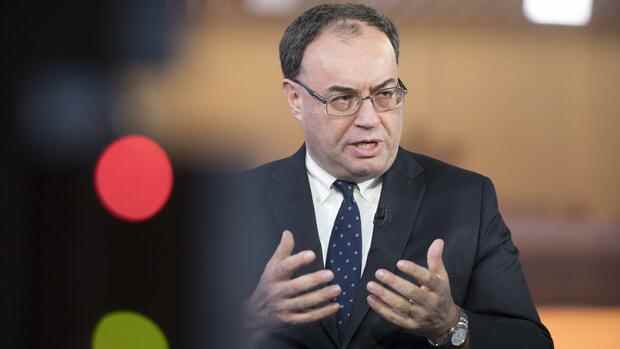BoE chief Andrew Bailey faces the House of Commons Finance Committee in London.
(Photo: Bloomberg)
London In December of last year, the Bank of England (BoE) raised interest rates in Great Britain, making it one of the first major central banks to initiate an interest rate turnaround. Three more rate hikes have followed since then.
Measured against the further increase in inflation, that hasn’t helped much: economists expect consumer prices to rise to nine percent in April, after seven percent in March. The “Old Lady”, as the BoE has been known since the end of the 18th century, expects the inflation rate to climb into double digits over the course of the year.
So it’s no wonder that Prime Minister Boris Johnson’s ruling Tories are looking for a scapegoat – and quickly found one: BoE governor Andrew Bailey and his colleagues offer plenty of room for attack. The British central bankers, like their colleagues at the ECB and the American Fed, believed for too long that the price surge would pass.
The hearing of the head of the British central bank on Monday afternoon before the Finance Committee of the House of Commons was more like a tribunal.
Top jobs of the day
Find the best jobs now and
be notified by email.
MEPs vented their displeasure at the skyrocketing cost of living in Britain. “Could the price hike have been avoided if the Fed had acted a little smarter?” asked Conservative Committee Chairman Mel Stride‧.
>> Read here: Global Trends: Neither supply-side politicians nor Keynesians have a recipe for stagflation
Historic shock for incomes
Above all, the surge in inflation has driven the prices for energy and important foodstuffs to socially intolerable heights. For more than 20 million British households, energy costs rose by around 50 percent in April.
A similar boost threatens in autumn when the price cap has to be adjusted to the market situation again. Even Bailey speaks of a “historic shock to real incomes”.
At the hearing, however, he blamed global factors such as the pandemic and the war in Ukraine for the highest inflation in 40 years. “80 percent of inflation above our target is accounted for by global prices,” Bailey said. However, he admitted that the hesitant recovery on the labor market, for example, had been underestimated.
The BoE boss had already made a similar statement in his letter to Finance Minister Rishi Sunak. Since becoming independent 25 years ago, the Bank of England has had to write a letter to the Chancellor of the Exchequer explaining why consumer prices have deviated by more than a percentage point from the inflation target of 2%.
Inflation threatens conservative government
For the Conservative government, inflation has become a political threat. The disastrous result in the local elections was a first warning. “The BoE, beyond any rational interpretation of the data, persisted in telling us that inflation was temporary and would then peak at 5 percent,” former Trade Secretary Liam Fox rumbled ahead of Monday’s hearing.
Critical voices are also increasing in the cabinet. Even the independence of the central bank is being questioned, the British media want to know. Johnson therefore jumped to the side of the battered “old lady” and let it be known that the independence of the BoE was “sacrosanct”.
BoE critic Fox nevertheless demands an investigation into why the central bankers have failed before inflation. The BoE most recently managed to achieve its inflation target of two percent in July 2021.
Criticism of Bailey and his colleagues is unlikely to subside because they can probably only bring the inflation rate back to the target value at the price of a recession. “In my opinion, the nominal interest rate needs to rise by at least 250 to 300 (more) basis points,” said former British central banker Adam Posen.
The economist and current President of the Peterson Institute for International Economics (PIIE) believes a recession in Great Britain is “probably necessary”.
More: Prosperity through Brexit 2.0 – Johnson wants even more distance to Europe
